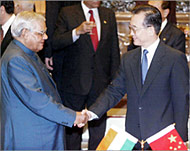India and China strengthen ties
India and China signed a series of agreements on Monday as both sides took steps to improve long-strained relations, during Indian Prime Minister Atal Behari Vajpayee’s visit to Beijing.

Vajpayee’s visit to improve relations and promote trade could also result in a new push to resolve a territorial dispute between the nuclear-armed neighbours, who fought a border war in 1962.
Vajpayee – the first Indian leader in China for a decade – said he hoped the two nations could be closer, in talks with Premier Wen Jiabao who also yielded pledges to increase trade.
“I hope my trip to China will strengthen trust and understanding between the two countries’ people and governments and further promote our broad co-operation,” he told Wen.
“We should focus on the simple truth that there is no objective reason for discord between us and neither of us is a threat to the other,” said the Indian premier.
The two states signed agreements to ease visa rules and a Chinese promise of $500 million to help develop India’s infrastructure.
The two countries were due to sign a joint declaration on a broad range of issues, most important of which is the border dispute, which remains a significant irritant.
One Chinese source said it might include a pledge to work “aggressively” to resolve the impasse. Indian diplomats said work on the statement was still underway.
They also stressed the need to enhance bilateral trade which has started to grow, but is still only worth $5 billion a year with India rivalling Belgium in China’s list of trading partners.
Concern
 |
|
The agreements symbolise a |
But Vajpayee made clear India’s concern about China’s long-standing relationship with arch foe Pakistan, in a remark criticising what he described as Islamabad’s failure to crack down on separatists fighting Indian rule in Kashmir.
New Delhi is concerned over what it calls Chinese nuclear and missile assistance to Pakistan, a charge Beijing denies.
Vajpayee, who has launched a new peace bid with Pakistan, told Wen he was disappointed there was no end to what he called “Islamabad’s involvement in Kashmir’s 13 years of strife”.
India controls about 45 percent of Muslim-majority Kashmir, Pakistan, a third and China the remainder. All three nations are nuclear powers.
Islamabad denies allegations of direct involvement in Kashmir, but says it gives moral support to what it calls a “struggle for self-determination”.
Vajpayee will also meet Chinese President Hu Jintao and central military commission chairman and former President Jiang Zemin before flying to the ancient city of Luoyang and Shanghai, China’s economic powerhouse.